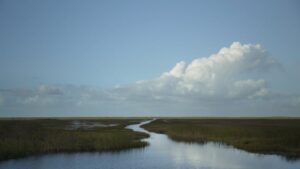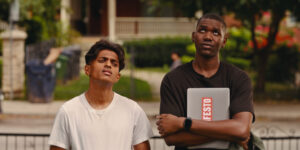Musa Syeed, Director, Valley of Saints
In 1521, the conquistador Ponce de León built his colonial residence in San Juan, naming it Casa Blanca. Today, almost 500 years later, the house is a museum where I had the privilege of screening my film Valley of Saints. In Puerto Rico, it’s hard not to see that the dialogue we’re having isn’t just between people, but between the past and the present.
The screening at Casa Blanca brought this home in a number of ways. Our amazing organizers invited activists from Caño Martín Peña, an unplanned community that was built on a major channel in San Juan’s estuary. The negative impacts that the residents of Caño have had on the estuary closely resemble the situation of communities in and around Kashmir’s Dal Lake, which is the setting for my film.
In the discussion afterwards, several people referenced the film’s upsetting images of Kashmir’s present environmental degradation as a warning sign of what the Caño might look like in a few years. While I didn’t get to take them up on their invites to visit their community, we could all agree that we have lost pieces of the past, but that we can at least try to hold on to what we have in the present.
The next day, this conversation turned even more personal. While hanging out at Contrafuertes, a really great artist community in San Juan, we were treated to what seemed to be spontaneous performance. Dancer and teacher Awilda Sterling took to the stage and climbed into a bit of scaffolding that resembled a prison cell.
While inside the “cell”, Awilda read a letter from Puerto Rican political prisoner Oscar Lopez Rivera. The letter described his transition from happily adjusted US citizen, to Vietnam soldier, to disillusioned vet, to community activist. This year marked his 32nd year in prison for “seditious activity”: using force to overthrow the government of the United States. But it’s clear that many people see him as a hero who received an unfair sentence.
The performance particularly struck me, because my father was also once a political prisoner, in Kashmir. I went to speak to Awilda, but before I could say anything, she told me she had been at my screening at Casa Blanca. After watching the film, and discussing it with friends, she decided to do this small performance. She even brought a newspaper article about Oscar for me.
And her performance, in return, resonated with me because I have yet to really talk to my dad about the experience of being in jail. It’s an unspoken subject between us, but it’s a part of our past that I am eager to know more about, a story I feel in my gut is worth preserving.
Reaching back to analyze our histories, no matter how painful or romanticized, can be a difficult task. But my experiences in Puerto Rico remind me that culture and creativity everywhere result from the complex, messy, tense dialogue between past and present. But it’s one worth having, because really, it’s a dialogue about something worthwhile: the future.







